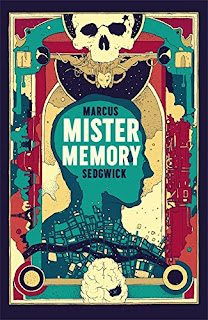Mister Memory - Marcus Sedgwick
The location and the period evoke this quality on their own, set in Belle Epoque Paris in 1899, in the seedy haunts of the brothels, cabarets and pornographer's dens of Pigaille, Montmartre and the Moulin Rouge. Locked up in the asylum of Salpêtrière is Marcel Després, also known in one of the lesser cabarets as Marcel Mémoire, or Mister Memory. His ability is more than just a stage act however, Marcel is able to remember everything he has ever seen, experienced or read, with total and instant recall, but the memory that haunts him and which has him locked in a cell at the local asylum is the one where he shot his unfaithful wife dead in falagrante delicto.
A young detective, Laurent Petit however is convinced that there is more to the case than seems. Marcel seems to have been locked away and swept out of the hands of justice with a little too much haste and convenience. His superiors are quick to warn him away from probing into the matter any further, but the more Petit persists in trying to get to the bottom of Marcel's guilt, the more he discovers about other sordid deviances and dark practices that have wider and more dangerous complications than he could have ever imagined. With the end of the millennium approaching, and the number of murders on the streets increasing and becoming more grisly, Petit starts to think that his chief Boissenot might be right in his fears that it's all a sign of the end of the world coming.
Well, evidently it's not the end of the world (reviewer takes a quick look around to make sure), but Marcus Sedgwick devise a wonderful grand conspiracy theory to throw into the midst of this great period Parisian setting. There are many fabulous threads to draw you in - the extent of Marcel's ability to remember ever detail of everything he has seen; the efforts of Dr Morel to explore the limits and the significance of this ability; and the actions of the police to cover up/uncover what really lies behind the murder of a cabaret dancer. It's a fascinating situation and well laid out, with the seeds of suspicion laid that there is a lot more to what has happened than you at first think.
Sedgwick has no trouble at all then holding the reader, not just dropping hints and gradually revealing little twists but really thinking through the psychological consequences and philosophical problems of what it might be like if we were unable to forget anything and retain every detail of our experiences, important and inconsequential alike, with no ability to tell them apart. Most importantly however, the author continually raises the grand conspiracy stakes and does so convincingly. Or if not convincingly, at least - as he also did in Love Like Blood - with a thrilling sense of dark danger that befits the setting and the period. The ending is satisfying in its resolution of the racing and racy pulp plot - if again like the previous novel, perhaps just a little abrupt - but it also finds a beautiful human note to end upon. You can't really ask for more than that.




Comments
Post a Comment